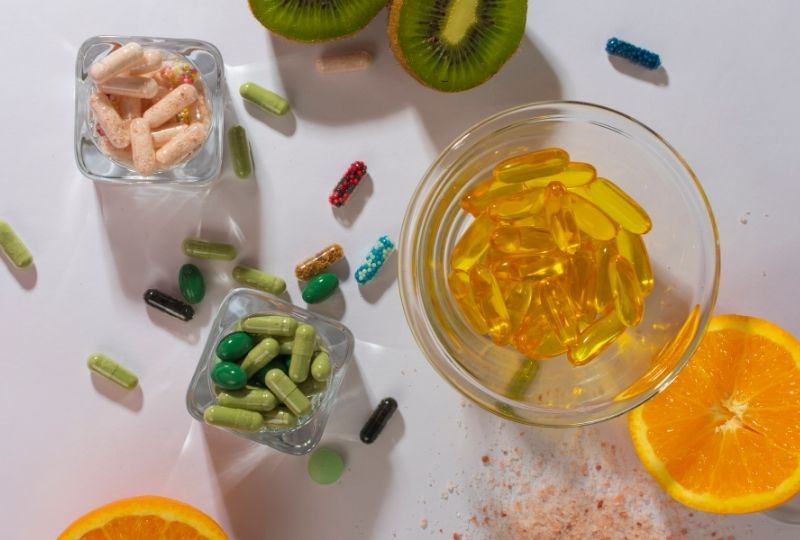Vitamins are essential nutrients that support nearly every function in the body. They help with immune strength, energy production, brain function, and overall well-being.
A deficiency in certain vitamins can lead to fatigue, weakened immunity, poor skin health, and long-term health problems. That’s why it’s important to get the right balance of vitamins through food or supplements.
In this guide, you’ll learn the key vitamins your body needs, their benefits, and how to get enough of them naturally.
Why Are Vitamins Important?
✅ Support immune function → Protects against illness and infections.
✅ Boost energy and metabolism → Helps convert food into energy.
✅ Improve skin, hair, and nail health → Supports cell regeneration.
✅ Enhance brain function → Affects memory, mood, and mental clarity.
✅ Promote strong bones and muscles → Helps with calcium absorption and muscle repair.
Essential Vitamins and Their Benefits
1. Vitamin A (For Vision and Skin Health)
🔹 Supports eye health and night vision.
🔹 Boosts immune function.
🔹 Helps maintain healthy skin and tissues.
✅ Best Food Sources:
- Carrots 🥕
- Sweet potatoes 🍠
- Spinach and kale 🥬
- Eggs 🥚
✅ Recommended Daily Intake:
- 700 mcg for women, 900 mcg for men.
2. Vitamin B Complex (For Energy and Brain Health)
The B vitamins help convert food into energy and support the nervous system.
🔹 B1 (Thiamine): Supports heart and nerve function.
🔹 B2 (Riboflavin): Helps with energy production.
🔹 B3 (Niacin): Supports brain function and digestion.
🔹 B6 (Pyridoxine): Helps regulate mood and reduce stress.
🔹 B12 (Cobalamin): Supports red blood cell formation and brain health.
✅ Best Food Sources:
- Whole grains 🍞
- Meat, poultry, and fish 🍗🐟
- Eggs and dairy 🥛
- Leafy greens 🥬
✅ Recommended Daily Intake:
- Varies by type (B12: 2.4 mcg per day).
3. Vitamin C (For Immunity and Skin Health)
🔹 Boosts immune system and wound healing.
🔹 Increases collagen production for skin elasticity.
🔹 Acts as a powerful antioxidant to fight free radicals.
✅ Best Food Sources:
- Oranges and citrus fruits 🍊
- Bell peppers 🌶
- Strawberries 🍓
- Broccoli 🥦
✅ Recommended Daily Intake:
- 75 mg for women, 90 mg for men.
4. Vitamin D (For Bone and Immune Health)
🔹 Helps absorb calcium for strong bones.
🔹 Supports immune defense against infections.
🔹 Plays a role in mental health and mood regulation.
✅ Best Food Sources:
- Sunlight exposure ☀️
- Fatty fish (salmon, tuna) 🐟
- Fortified dairy and cereals 🥛
✅ Recommended Daily Intake:
- 600–800 IU per day.
5. Vitamin E (For Skin and Cellular Protection)
🔹 Acts as an antioxidant to protect cells from damage.
🔹 Supports healthy skin and hair.
🔹 Helps maintain a strong immune system.
✅ Best Food Sources:
- Nuts and seeds 🥜
- Avocados 🥑
- Spinach and leafy greens 🥬
✅ Recommended Daily Intake:
- 15 mg per day.
6. Vitamin K (For Bone and Blood Health)
🔹 Helps with blood clotting and wound healing.
🔹 Supports bone strength and calcium regulation.
✅ Best Food Sources:
- Kale, spinach, and broccoli 🥦
- Green beans
- Eggs and dairy 🥚
✅ Recommended Daily Intake:
- 90 mcg for women, 120 mcg for men.
How to Get Enough Vitamins Naturally
🔹 Eat a variety of whole foods (fruits, vegetables, lean proteins, and whole grains).
🔹 Spend time in the sun for natural vitamin D production.
🔹 Limit processed foods, which often lack essential nutrients.
🔹 Consider supplements if you have dietary restrictions or deficiencies.
Final Thoughts
Vitamins play a critical role in overall health. By focusing on a balanced diet with nutrient-rich foods, you can support your immune system, energy levels, and well-being naturally.
Which vitamins do you need to focus on more in your diet? 😊
